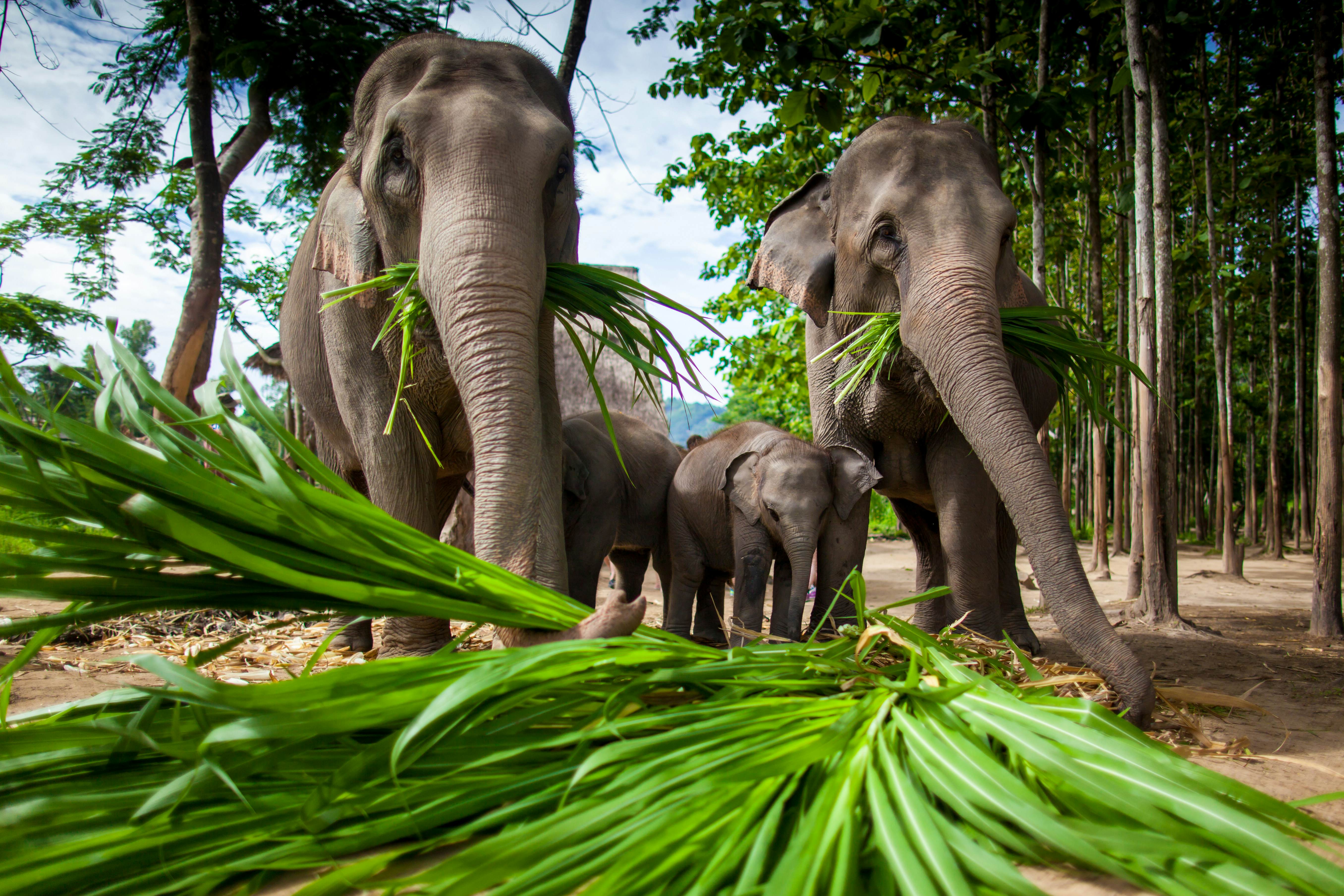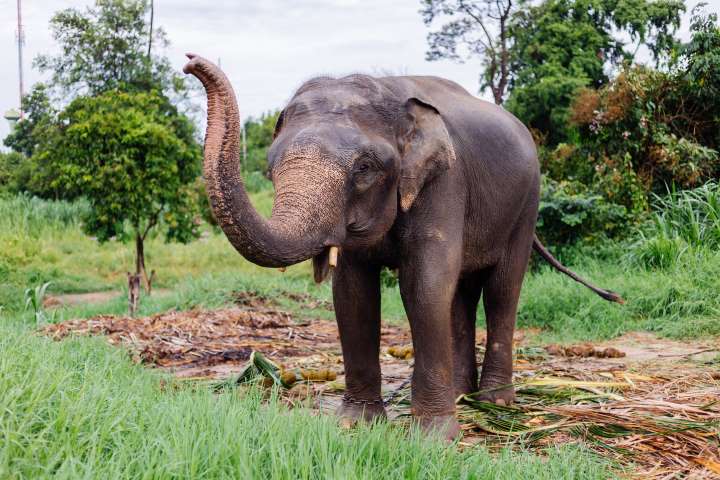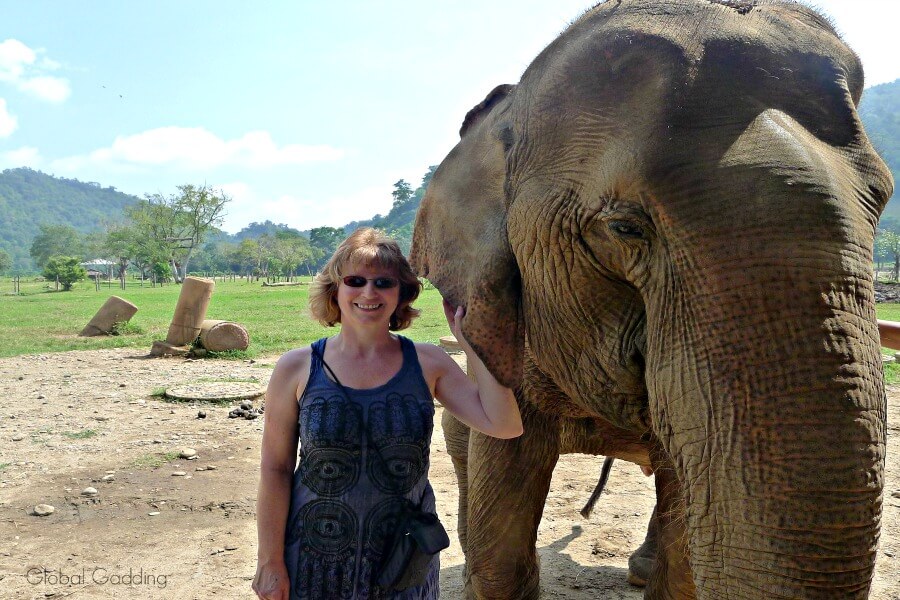Have you ever wondered what it’s like to encounter Thailand’s majestic elephants up close? These gentle giants are not only beautiful and awe-inspiring, but they also play a significant role in Thai culture and history. In this article, we’ll take a closer look at the ethical encounters with these incredible creatures and how you can have a meaningful and responsible experience with them during your visit to Thailand.
Thailand is home to a number of elephant sanctuaries and rescue centers that aim to provide a safe and natural environment for these animals. Unlike traditional elephant camps or tourist attractions where elephants are often mistreated and forced to perform, these ethical sanctuaries prioritize the well-being and conservation of elephants. You’ll have the opportunity to observe these majestic creatures in their natural habitat and learn about their behavior, diet, and social structures.
Elephant encounters at ethical sanctuaries are nothing like the typical tourist experiences you may have heard of. Instead of riding elephants or watching them perform tricks, you’ll have the chance to interact with them in a way that is respectful and non-intrusive. From feeding and bathing them to walking alongside them in their natural environment, these encounters allow you to form a deeper connection with these magnificent animals. In addition, your visit to these sanctuaries directly supports their ongoing efforts to rescue and rehabilitate elephants, as well as educating the public about the importance of conservation.
In the following article, we’ll delve deeper into the specific guidelines and practices that make these encounters ethical, as well as how you can choose a reputable sanctuary to visit. So if you’re interested in embarking on a truly meaningful and ethical elephant encounter during your trip to Thailand, keep reading to learn more about this amazing opportunity. Thailand’s majestic elephants have long captivated the hearts of locals and tourists alike. These gentle giants hold a special place in the country’s cultural heritage and are regarded as symbols of strength, wisdom, and prosperity. However, the rise of tourism in Thailand has brought about a myriad of ethical concerns regarding the treatment and exploitation of these magnificent creatures. In this article, we will delve deeper into the impact of tourism on Thailand’s elephants and explore the alternatives and initiatives that promote ethical encounters.
The Role of Tourism in Thailand’s Elephant Industry
Tourism plays a significant role in Thailand’s elephant industry, with many visitors seeking out experiences that allow them to interact with these remarkable creatures. Elephant camps have sprouted across the country, offering activities such as elephant riding, performances, and photo opportunities. These activities have become popular tourist attractions, generating revenue for both the camps and the local economy.
The Exploitation of Elephants for Tourism Purposes
Unfortunately, the flourishing elephant tourism industry has come at a heavy cost to the welfare and well-being of these animals. Many elephants in these camps are subjected to cruel and inhumane training methods, such as the use of bullhooks – sharp-ended tools used to control and discipline the elephants through pain and fear. Constant riding and performing also take a toll on their physical and mental health, as they are forced to work long hours without proper rest or access to their natural habitat.
The Environmental and Societal Consequences of Elephant Tourism
The consequences of elephant tourism extend beyond the ethical concerns surrounding animal welfare. The increasing demand for tourist interactions with elephants has led to habitat destruction and fragmentation, resulting in the loss of crucial natural environments for these animals. Additionally, the reliance on captive elephants for entertainment purposes has led to a decline in wild elephant populations as poaching and illegal trade persist.

Unethical Practices in Thailand’s Elephant Tourism
Elephant Riding and Performing
One of the most widely criticized activities in elephant tourism is elephant riding. While it may seem like a thrilling experience for tourists, the reality is far from enjoyable for the elephants. The weight of the saddle and the constant pressure on their spines can cause long-term damage and chronic pain, leading to a shortened lifespan.
Similarly, the performing elephants in shows are often subjected to rigorous training methods that involve punishment and deprivation. Tricks such as balancing on two legs, painting, and playing musical instruments may seem impressive, but they come at the expense of the elephant’s natural behaviors and instincts.
The Role of Elephant Camps in Exploiting Elephants
Elephant camps are at the forefront of the exploitation of elephants for tourism purposes. Many of these camps offer visitors the opportunity to ride or watch performances, without considering the negative impact on the elephants’ physical and mental well-being. The demand for such activities indirectly supports the continued mistreatment of these animals.
The Use of Bullhooks and Other Cruel Practices
Bullhooks, also known as ankus, are commonly used in elephant camps to control and discipline the elephants. These tools, consisting of a sharp prod and a hook, are often used to deliver painful blows, inflicting physical harm to the elephants. This practice is both physically and emotionally damaging to the animals and can result in severe injuries.
Other cruel practices include the separation of baby elephants from their mothers at a young age, a process known as “phajaan.” This traumatic experience involves isolating and physically restraining the baby elephants, depriving them of their mother’s care and affection.
Alternatives to Unethical Elephant Tourism
Supporting Ethical Elephant Sanctuaries
One of the most effective ways to promote ethical encounters with elephants is to support and visit genuine elephant sanctuaries. These sanctuaries prioritize the well-being and welfare of elephants by providing them with a safe and natural environment. Visitors to these sanctuaries can observe elephants in their natural habitats, participate in non-invasive activities like feeding or bathing, and learn about conservation efforts.
Promoting Elephant Conservation Efforts
Conservation organizations and initiatives play a crucial role in protecting Thailand’s elephants. By supporting these efforts, tourists can contribute to the conservation and preservation of elephant populations. Funding research, habitat restoration projects, and anti-poaching measures are just a few ways tourists can make a positive impact on elephant conservation.
Educating Tourists about Ethical Elephant Encounters
Education is key in fostering a responsible and ethical tourism culture. Providing tourists with information and guidelines on how to have ethical elephant encounters can significantly impact the well-being of these animals. Tour operators should prioritize education, emphasizing the importance of respecting the elephants’ natural behaviors and promoting sustainable practices.

Understanding the Needs and Welfare of Thailand’s Elephants
The Social Organization and Behavior of Elephants
Elephants are highly intelligent and social animals with complex family structures. They rely on close-knit relationships within their herds and rely on communication and cooperation for survival. Separating them from their families or subjecting them to stressful and unnatural behaviors disrupts their social bonds and contributes to psychological distress.
The Importance of Natural Habitat for Elephant Well-being
The natural habitat of elephants, including lush forests and expansive landscapes, is vital for their physical and mental well-being. Providing elephants with ample space to roam freely, access to fresh water, and a diverse diet is essential for their overall health. Encouraging elephant tourism that respects and protects their natural habitat is crucial for their long-term survival.
The Physical and Mental Health of Elephants
The physical and mental health of elephants should be a top priority when it comes to ethical encounters. Elephants in captivity require proper nutrition, veterinary care, and mental stimulation to thrive. Access to shade, bathing opportunities, and interactions with other elephants are essential for their well-being. Ensuring that these needs are met is essential for providing ethical encounters with elephants.
Collaborative Efforts towards Elephant Conservation
Government Regulations and Policies for Elephant Protection
The Thai government has implemented regulations and policies to protect elephants from exploitation and mistreatment. These regulations aim to prevent the illegal capture and trade of elephants, promote humane treatment, and encourage responsible elephant tourism practices. Enforcing and revising these regulations, along with allocating resources for their implementation, is crucial for the long-term preservation of elephants.
International Conservation Organizations Working in Thailand
International conservation organizations have also contributed significantly to elephant conservation efforts in Thailand. These organizations partner with local communities, government agencies, and research institutions to develop and implement conservation strategies. Their expertise and resources are invaluable in the fight to protect and preserve Thailand’s majestic elephants.
Community-based Conservation Initiatives
Local communities play a vital role in the conservation of elephants. Engaging with and empowering these communities to become active participants in elephant conservation efforts is crucial. By promoting sustainable livelihoods and providing education on elephant conservation, these initiatives help alleviate the pressure on elephants and their habitats.

Responsible Tourism and Sustainable Elephant Encounters
The Role of Responsible Tour Operators in Promoting Ethical Practices
Responsible tour operators have a fundamental role in promoting ethical practices in elephant tourism. By choosing to work exclusively with ethical elephant sanctuaries, these operators ensure that tourists have genuine and responsible encounters with elephants. They prioritize the well-being of the elephants and educate their clients on the importance of ethical tourism.
The Benefits of Sustainable Tourism for Elephant Conservation
Sustainable tourism practices benefit both elephants and local communities. By emphasizing responsible and ethical encounters, sustainable tourism contributes to the long-term conservation of elephants and their habitats. Additionally, sustainable tourism provides economic support to local communities, enhancing their livelihoods and incentivizing their commitment to conservation efforts.
Minimizing the Negative Impact on Wildlife and Local Communities
Responsible elephant tourism goes hand in hand with minimizing the negative impact on wildlife and local communities. It is essential to consider the carrying capacity of these areas, ensuring that tourism activities do not exceed the environment’s ability to sustain the elephants and their natural habitat. Additionally, responsible tourism practices should support local communities and respect their way of life.
The Ethical Dilemma of Elephant Tourism
Balancing the Economic Benefits and Ethical Concerns
The ethical dilemma surrounding elephant tourism lies in the delicate balance between the economic benefits and the ethical concerns involved. Tourism provides employment opportunities and economic support to local communities, helping alleviate poverty and improve living conditions. However, the welfare and well-being of elephants should not be compromised for economic gains. Striking a balance between these factors requires a collaborative effort from the tourism industry, government agencies, and visitors.
The Importance of Recognizing Elephant Rights and Welfare
Recognizing the rights and welfare of elephants is crucial for ethical encounters. Elephants deserve to live in a natural habitat, free from exploitation and harm. Protecting their rights means advocating for stricter regulations, providing proper care and protection, and ensuring their well-being throughout their lives.
The Need for Responsible Consumer Choices
As conscious consumers, we have the power to make responsible choices that have a significant impact on elephant conservation. By supporting ethical elephant encounters and boycotting activities that exploit or harm elephants, we send a powerful message to the tourism industry. Choosing tour operators and establishments that prioritize the well-being of elephants encourages and supports responsible practices.

Educating Tourists about Ethical Elephant Encounters
Raising Awareness about Unethical Elephant Tourism
Raising awareness about the unethical practices in elephant tourism is essential in effecting change. Tourists should be informed about the harmful effects of activities such as riding, performing, and direct contact with elephants. By understanding the ethical concerns, tourists can make informed decisions and choose alternatives that prioritize the welfare of elephants.
Promoting Ethical Elephant Tourism through Marketing Campaigns
Marketing campaigns have the potential to reach a wide audience and influence consumer choices. By promoting ethical elephant encounters and showcasing responsible tour operators, these campaigns can shift the demand towards more ethical tourism practices. Collaborating with conservation organizations and emphasizing the importance of wildlife welfare can further strengthen these campaigns.
Providing Information and Guidelines for Responsible Elephant Interactions
Tourists should be provided with comprehensive information and guidelines for responsible elephant encounters. This can be done through brochures, websites, and information centers, educating visitors about the ethical concerns and promoting alternative activities that prioritize conservation and animal welfare. By equipping tourists with the knowledge to make responsible choices, we can create a positive change in the elephant tourism industry.
Empathy and Advocacy for Thailand’s Majestic Elephants
Supporting Organizations and Initiatives for Elephant Welfare
Supporting organizations and initiatives dedicated to elephant welfare is a tangible way to make a difference. Donations, volunteer work, and fundraising efforts can provide much-needed resources to these organizations, enabling them to continue their important work in protecting and caring for elephants.
Advocating for Stronger Animal Welfare Laws
Advocacy plays a significant role in improving animal welfare standards. By raising our voices and advocating for stronger animal welfare laws, we can push for changes in legislation that protect elephants from exploitation and abuse. Collaborating with like-minded individuals and organizations amplifies our impact and increases the chances of achieving meaningful change.
Empowering Local Communities to Protect Elephants
Empowering local communities to protect elephants establishes a sense of ownership and accountability. By involving them in conservation efforts, providing education, and creating economic opportunities that do not rely on exploitative practices, we foster a sustainable and long-lasting commitment to the conservation of elephants.

Conclusion
Thailand’s majestic elephants are a national treasure and deserve to be treated with the utmost respect and care. By promoting ethical encounters, supporting conservation efforts, and advocating for stronger animal welfare laws, we can work towards a future where elephants can thrive in their natural habitats. As responsible tourists and compassionate individuals, it is within our power to create positive change and ensure a brighter future for Thailand’s majestic elephants.
